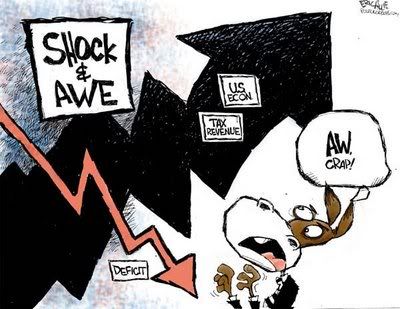
(Numerous other Democratic expletives deleted - not suitable for a family-friendly blog)
(This post inspired by Dr. Sanity)
When a Liberal has holes bored in his head, the truth finally gets a chance to penetrate. In an article posted to Time.com on July 16, 2006, Yes, It Really Is Brain Surgery Be nice to the man with the holes in his head, by Michael Kinsley (a great talent, to whom I wish all the best recovery from surgery for Parkinson’s Disease), Michael wrote that he was working on the line he would deliver when he came out of surgery.
Time Magazine update: Kinsley's surgery took place on July 12 and went fine. His first words were, "Well, of course, when you cut taxes, government revenues go up. Why couldn't I see that before?"
What wonderful timing for Michael Kinsley, to see the light just as President Bush was announcing:
"This economy is growing, federal taxes are rising, and we're cutting the federal deficit faster than we expected," Bush noted, citing a mid-year report released earlier in the day by the Office of Management and Budget (OMB). "As a matter of fact, we're a year ahead" of cutting the deficit in half by 2009, he stated.After noting that his administration's original deficit projection for the fiscal year ending Sept. 30, 2006, was $423 billion, the president stated: "Today's report from OMB tells us that this year's deficit will actually come in at about $296 billion," a decline of $127 billion.At one time even the Democrats knew the power of cutting taxes to create economic growth and increase tax revenues. Although Teddy Kennedy cried “foul” when President Bush brought this fact up in his 2004 election campaign, according to President Kennedy (Heritage Foundation Tax Research) :
“Our true choice is not between tax reduction, on the one hand, and the avoidance of large Federal deficits on the other. It is increasingly clear that no matter what party is in power, so long as our national security needs keep rising, an economy hampered by restrictive tax rates will never produce enough revenues to balance our budget just as it will never produce enough jobs or enough profits. Surely the lesson of the last decade is that budget deficits are not caused by wild-eyed spenders but by slow economic growth and periodic recessions and any new recession would break all deficit records. In short, it is a paradoxical truth that tax rates are too high today and tax revenues are too low and the soundest way to raise the revenues in the long run is to cut the rates now.”
President Kennedy proposed a series of tax rate reductions in 1963 that resulted in legislation the following year dropping the top rate from 91 percent in 1963 to 70 percent by 1965.
The Kennedy tax cuts helped trigger the longest economic expansion in America's history. Between 1961 and 1968, the inflation-adjusted economy expanded by more than 42 percent. On a yearly basis, economic growth averaged more than 5 percent.
Tax revenues grew strongly, rising by 62 percent between 1961 and 1968. Adjusted for inflation, they rose by one-third.
After the Jimmy Carter-inspired malaise, the Reagan era began.
Reagan's across-the-board tax cuts ushered in America's longest peacetime expansion, helping to create 20 million new jobs and pushing incomes and living standards to record highs.
The economic effects of the Reagan tax cuts were dramatic. When Reagan took office in 1981, the economy was being choked by high inflation and was in the middle of a double-dip recession (1980 and 1982). The tax cuts helped pull the economy out of the doldrums and ushered in the longest period of peacetime economic growth in America's history. During the seven-year Reagan boom, economic growth averaged almost 4 percent.
As a direct result of the Reagan tax cuts, total tax revenues climbed by 99.4 percent during the 1980s, and the results are even more impressive when looking at what happened to personal income tax revenues. Once the economy received an unambiguous tax cut in January 1983, income tax revenues climbed dramatically, increasing by more than 54 percent by 1989 (28 percent after adjusting for inflation).
After Michael Kinsley came to after surgery and stated his revelation, his next words to the doctors and nurses gathered round probably were: “I hope you’re all Democrats, and not a word of this gets out.”
(Seamlessly – maybe shamelessly – shifting from the medical theater to a courtroom scene)
Ladies and Gentlemen of the jury, in summation, this is an open and shut case. Tax cuts encourage economic activity and grow the economy, and a growing economy increases total tax revenues.
Case closed.
No comments:
Post a Comment